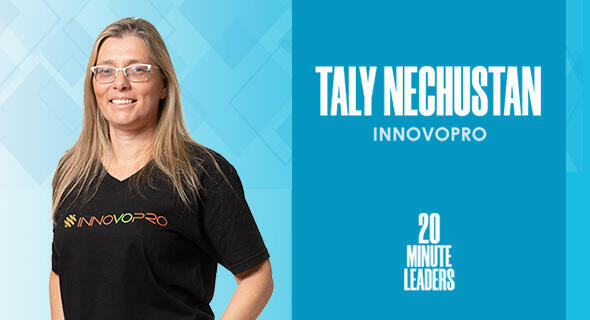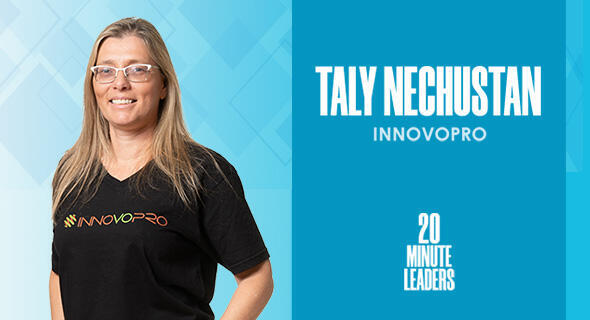
20-Minute Leaders
“Processed food doesn't have to be bad. Right now, it's not that good.”
Chickpea products are the third generation of plant-based protein that will improve on the previous options, says Taly Nechushtan, CEO of InnovoPro.
Chickpea products are the third generation of plant-based protein that will improve on the previous options, says Taly Nechushtan, CEO of InnovoPro. Soy and pea proteins have offered good nutritional value, she shares, but they have not checked all the boxes that InnovoPro’s chickpea-based protein does. Their product is sustainable, nutritious, functional, and tasty, she says. It is used as an ingredient in processed food, which Nechushtan explains doesn’t have to be bad or full of unrecognizable ingredients. While they have rolled out a few products based on chickpea proteins, she says that InnovoPro intends to expand into using other parts of the chickpea as well. This will help meet the demand of consumers and food companies alike, who are curious about finding solutions for better processed food. Nechushtan is passionate about marketing and sustainability and enjoys combining them to improve the future of food.
Click Here For More 20MinuteLeaders
How did your career shape into food tech? How did that happen?
I think all good things happen by chance. I started my life at a CPG business as an accountant. After I started my MBA with two majors, finance and marketing, I fell in love with the marketing side. In marketing, I was part of teams that led beautiful launches of food products to new markets. My journey was going through food companies, communication companies, and infrastructure companies who were dealing a lot with sustainability. The sustainability bug also implemented in me. So marketing and sustainability are the core of my passion.
I met the founder of InnovoPro, Dr. Shmulewitz, and then I met my third passion, which is chickpea and plant-based proteins.
What was this aha moment for you that made you want to join as CEO of this company?
I realized that the future of food is connected very strongly to new technologies of plant-based proteins and that the well-being of humanity is very much connected to what we eat, how we behave. I think both things joined together. As the first employee, I studied for six months the ecosystem and the competition and the consumer behavior. I realized that this is important to me personally and will probably affect the future of our children.
What is it about chickpeas that makes sense? Why is this a viable solution?
I think chickpeas were always like the royal legume. It was considered very rich in protein and better for human health. A lot of cultures in the Far East eat chickpeas three times a day. Also, Israelis and all our neighbors in the Middle East have eaten hummus for generations.
There are even articles that say eating chickpeas makes you happy. So it's not a surprise that many important magazines and researchers are now calling it the chickpea phenomena, the "mighty chickpea." It's one of the leading emerging pulses that are in the interest of consumers. People would like to see more and more chickpeas in general in their diet. But we are very busy people. It's not possible for us anymore to cook a chickpea meal three times a day.
We rely a lot on food companies and what we call processed food. Processed food doesn't have to be bad. Right now, it's not that good. Consumers read the list of ingredients, see ingredients that they cannot pronounce, and they are concerned. I think this movement of consumers that are putting back on the shelf products that are too processed is the InnovoPro opportunity.
What we're offering is an ingredient that can combine in a processed food; however, it enables the creation of clean label recipes with a short list of ingredients that are recognizable. Chickpea protein is a smart ingredient. It enables the creation of clean label applications that are very diversified. They can make yogurt with the chickpea protein and you really have a sense of creaminess that you cannot suspect is coming from legumes.
The biggest problem of the consumers that would like to do something good for the environment, to reduce their meat consumption and their dairy consumption, is the taste. A lot of people report that they cannot stand even the smell of some plant-based proteins. It's a challenge to create plant-based protein products that are also tasty. This is another strong attribute or uniqueness of the chickpea protein of InnovoPro because it has a neutral taste.
There are important qualities that this ingredient has in one: clean labelness, taste, functionality, and sustainability. Our process is highly sustainable. The farmers use the chickpea as a rotational crop. It brings back nitrogen to the soil. We source it next to the factory, and then we apply our technology. In the end, we get our CP‑PRO 70.
What really was the catalyst for all of this? Is this a new idea that chickpeas can facilitate as a smart agent for a lot of these processes?
We have been eating plant-based proteins for many years. The first era of plant-based protein was soy protein. It is extracting the protein from soybeans in a way that is considered today by consumers not sustainable because it's using organic solvents. It is a very good source of protein, very nutritious. However, its process is not necessarily a sustainable one.
The second generation, which is an improvement of plant-based protein, was the pea protein. However, the challenge with pea protein is the taste. Companies need to mask the taste with a lot of helping agents. Also, the pea protein has its own challenges in functionality, solubility, and so on.
Always we want something better, so the next generation of protein should compensate for everything that lacks in the first two. We're offering the CP‑PRO 70 as the third generation of proteins that will be sustainable, nutritious, tasty, and functional.
Where is InnovoPro positioned today? What is the vision of where you're taking this company?
Today, we're a team of more than 20 multidisciplinary professionals coming from different fields. We're looking into being a platform of chickpea-based ingredients. We discovered that CP‑PRO 70 can be the first pioneer in the list of products that are available from the chickpea. We intend to invest a lot in research and development in order to utilize the side streams of our process, because the chickpea has much more inside. It has fibers, it has oil, it has starch, and it has sugars. All of them are very interesting ingredients that can contribute to those food companies that are looking for clean label ingredients.
We issued, this year, two new products that are based on CP‑PRO 70. TVP is a texturized plant-based protein that is mainly used for the meat analogue industry. It has a structure and it contributes to the bite feeling. The second one is a product that mimics the egg white functionality for industrialized baking companies. So they can create meringue, for example, without the egg white.
Is this trivial for the companies that you're selling to? Do they immediately understand how this can be a solution that can be an enabler for them for many things?
I think there is a lot of curiosity about that. The R&D teams in companies have curious people inside. They want to discover new ingredients in order to become more relevant to consumers. There is a demand, and there is a lot of curiosity to find new ingredients, to find new solutions.
The implementation part is harder. Sometimes such processes take some time until those companies reach enough maturity, enough understanding. They're building their own machine line sometimes. Sometimes the machines that are used for regular yogurt are not the same as for plant-based, so they sometimes need to buy new equipment or to get their hands on some knowledge that they didn't have before. So it takes some time.
But we see that the need is out there. The demand is very big. More and more companies are getting confident from seeing new launches of other companies in other regions. The more the merrier.
Michael Matias, Forbes 30 Under 30, is the author of Age is Only an Int: Lessons I Learned as a Young Entrepreneur. He studies Artificial Intelligence at Stanford University, is a Venture Partner at J-Ventures and was an engineer at Hippo Insurance. Matias previously served as an officer in the 8200 unit. 20MinuteLeaders is a tech entrepreneurship interview series featuring one-on-one interviews with fascinating founders, innovators and thought leaders sharing their journeys and experiences.
Contributing editors: Michael Matias, Megan Ryan















